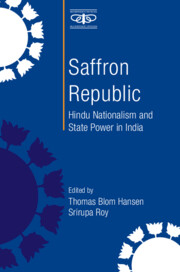5 - New Hindutva and the ‘UP Model’: An Interview with Neha Dixit and Nakul Sawhney
Published online by Cambridge University Press: 31 May 2022
Summary
NEHA DIXIT is an independent journalist working from Delhi, India. Her journalism revolves around the themes of Hindu nationalism, gender, and social justice in South Asia, and her work has been published in several leading media outlets including The Wire, Al Jazeera, New York Times, Outlook, and Caravan. Her published works are available online at http://neha-dixit.blogspot.com/. Neha has won numerous awards for her work, including the International Press Freedom Award (2019), the Kurt Schork Award in International Journalism (2014), the European Commission's Lorenzo Natali Media Prize (2011), and the Chameli Devi Jain Award for Outstanding Woman Journalist (2016).
NAKUL SAWHNEY is an independent documentary filmmaker. His work has largely focused on issues of human rights, gender, communalism, labour rights, caste, and social justice. Prominent films include Izzatnagari ki Asabhya Betiyaan (Immoral Daughters in the Land of Honour) and Muzaffarnagar Baaqi Hai (Muzaffarnagar Eventually). He founded and is currently running a film and media collective, ChalChitra Abhiyaan, based in western Uttar Pradesh.
Tell us about how you have engaged with Hindu nationalism in your work.
NAKUL: I think my involvement with Hindutva politics goes back to 2010 when I started working on Izzatnagari ki Asabhya Betiyaan, which is set in the Jat belt, largely in Haryana (Sawhney 2011). It's a film that looks at crimes and killings in the name of honour and the resistance by young women against self-styled caste authorities, the khap panchayats which are passing diktats against self-choice marriages. When I look at it in retrospect, I think that the sort of Jat identity politics that was deeply anti-women and anti-Dalit created a fertile ground for Hindutva to flourish in west Uttar Pradesh (UP) and in Haryana as well.
I then worked on several other documentaries set in west UP. Muzaffarnagar Baaqi Hai looks at the Muzaffarnagar massacre of 2013. The film explores the various social, political, and economic reasons and fallouts of the massacre. A film screening was attacked by the Akhil Bharatiya Vidyarthi Parishad (ABVP), the student wing of the Rashtriya Swayamsevak Sangh (RSS), on 1 August 2015 at Kirori Mal College in Delhi University. The film was subsequently screened in many parts of the country to oppose the disruption at Delhi University. Several other screenings were also stopped and attacked by right-wing goons and local police. Dalit scholar and activist Rohith Vemula had also organized a screening at Hyderabad Central University (HCU).
- Type
- Chapter
- Information
- Saffron RepublicHindu Nationalism and State Power in India, pp. 107 - 129Publisher: Cambridge University PressPrint publication year: 2022

